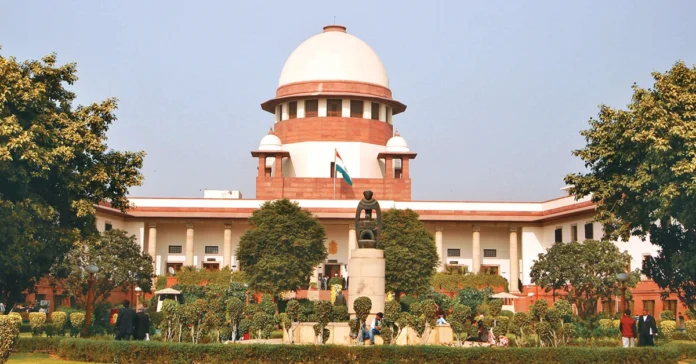The Supreme Court on Friday pulled up the Central government and the Delhi Police for letting a Russian woman escape the country with her minor son and reach Russia, in violation of it’s previous orders in a child custody case.
The Bench of Justice Surya Kant and Justice Joymalya Bagchi observed that the Delhi Police not only failed to keep surveillance on the Russian woman’s house but also did not take any timely action when the child’s father filed a missing complaint regarding the woman and his minor child on July 7.
The incident of taking the child by petitioner Victoria Basu apparently happened due to sheer negligence and failure of Delhi Police, it observed.
Noting that a minor child was taken away from the custody of the Court, the Bench said this was not a simplicitor case of custody dispute between parents and a child, whose custody had not been handed over to either the father or mother. It was in exercise of it’s duty as parens patriae that the Court was resolving the issue.
Appearing for the Union government, Additional Solicitor General (ASG) Aishwarya Bhati informed the Court about the status reports given by the Delhi Police, the Ministry of Home Affairs and the Ministry of External Affairs.
The Apex Court then directed the Ministry of Home Affairs, Foreigner Division or the Ministry of External Affairs to immediately apprise the Indian Embassy in Moscow, Russia, and establish contact with Basu and the minor child.
It questioned the responsibility and the actions taken by the Delhi Police. The Local SHO and DCP of the area would also not be spared as they owed a responsibility and should have acted accordingly, it added.
The top court of the country said that since the matter was brought to the notice of the Delhi Police on July 7, action could have been taken by them.
Bhati submitted that Basu took taxi towards Bihar and then went to Nepal. She took a flight from Nepal on July 12.
The Bench observed that the period between July 7 to 14 was crucial as Basu was still travelling during that time. No FIR, complaint was lodged by the Delhi Police and no questions were asked to the Embassy. There was no plan of action by the Respondents on how to deal with the situation further, it added.
The ASG stated that the Delhi Police ensured surveillance, but not for 24 hours. However, she acknowledged that prior to July 7, Delhi Police couldn’t take any action.
The Court then pointed out that in it’s previous order, it had directed the deployment of women police officers.
When Bhati said that even the Delhi Police was not aware of the whereabouts of the Russian woman till July 18, the Court said they were not aware because no effort was made by them. It was pure criminal negligence of the Delhi Police. They equally partnered in the violation of this Court order, it added.
The Bench directed the Ministry of Home Affairs or the Ministry of External Affairs to immediately contact the Indian Embassy in Moscow, Russia, who shall then find out the ways to establish contact with Basu and the minor child.
Bhati sought some time since the Russian woman had fled from India and diplomatic channels in Nepal, UAE and Russia would have to be used.
The Bench assured of all possible help from its side and asked her to immediately contact the Indian Embassy in Russia.
When the Court suggested the use of INTERPOL to access travelling documents of Basu, Bhati submitted that privacy was one of the reasons that information on the issue might not be shared.
No airlines on earth could plead privacy in the matter of commission of crime, observed the Bench and asked Bhati to confirm whether the Russian Lady and the child were actually in the Russian Federation.
It further hinted at the offence of forgery of passports on the grounds that original passports of Basu and the child were still in the custody of the Court.
The Bench observed that before it took any harsh action, the authorities should immediately contact the Indian Embassy in Russia, avail the services of INTERPOL and take further necessary legal action in terms of bilateral treaties.
The matter was related to a custody dispute between Saikat Basu, an Indian national residing in Kolkata, and Viktoriia Basu, a Russian national. Divorce proceedings were pending before a family court.
The Supreme Court had earlier directed a split custody arrangement, first for 20 hours with the father and 4 with the mother, later revised to three days a week with the mother and four with the father.
Saikat Basu moved the Court after Victoria allegedly went missing with the child on July 7. He claimed she was last seen entering the Russian Embassy in Delhi with luggage, accompanied by an Embassy official.
On July 18, the Apex Court directed the Delhi Police to issue a look-out circular and submit a status report. On July 21, the top court of the country directed the Delhi Police, the Ministry of External Affairs, and police authorities to submit a comprehensive status report on the issue.


